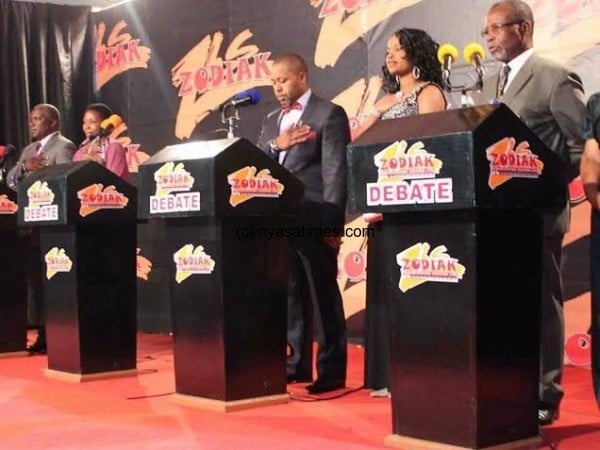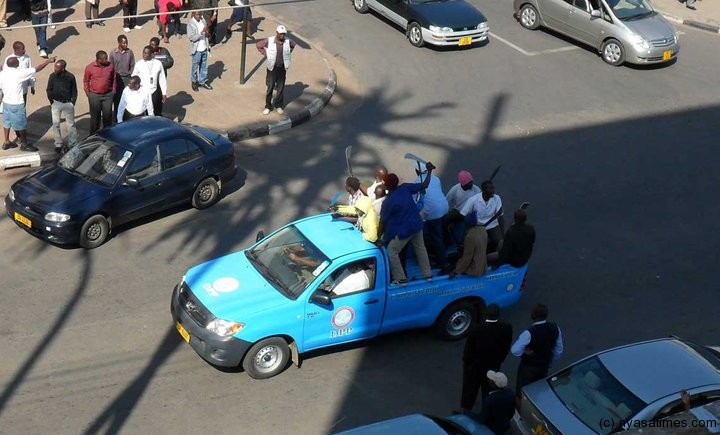DPP’s Chilima wins in running mates final debate
The Democratic Progressive Party (DPP) running mate, Saulosi Chilima, redeemed his previous lacklustre showing, by pulling off an outstanding performance in the second and last Zodiak Broadcasting Station arranged running mates’ debate on Friday night in Blantyre.
Presidential running mates from the four major parties in the May 20 Tripartite Elections were invited by multi-award winning private broadcaster Zodiak Broadcasting Station (ZBS) for the second debate but governing People’s Party (PP) withdrew, citing Zodiak’s bias towards the opposition Malawi Congress Party (MCP) in the first ever debate which was held in Lilongwe.
At Comesa Hall, experienced agriculturalist Dr Godfrey Chapola represented the United Democratic Front (UDF) whereas former Airtel Malawi managing director Chilima represented the DPP, and former Cabinet minister Richard Msowoya stood in for MCP.

Smarting from criticism of trying to be too smart and detached in the previous encounter, Chilima showed up for the second round with aplomb and style, replete with eloquent articulation of issues, and won it.
The best way to win a political debate is to prepare for it. This includes practicing in front of a mirror to see how you will appear to others, and making sure you are on top of all the issues.
It may not be immediately established if the practices in front of the mirror took place, although the hints to his poise and style speculated to it. In evidence, though, was that Chilima had come to the debate having done his homework. He mastered and appeared knowledgeable on a wide variety of topical issues.
Naturally he has got charisma and possesses oratory abilities. By training he is an economist. By practice he is a top-of the range marketer, manager and leader. All these attributes, rolled into one, came to bear on a night Chilima appeared to be comfortable with the themes and enjoying outclassing his co-panellists.
But even as the evening was favourable to him, he did not get carried away. He stayed even-tempered and relaxed even when at some point things got heated with moderator Joab Frank Chakhaza, an ability which made him appear confident and trustworthy.
MCP’s Msowoya, who stood out the best in the first debate, faced the challenge of remaining a politician to an audience of mainly technocrats, on topics that needed technical narratives as opposed to political soundbytes, which during the first debate, resonated well with a largely politically motivated audience in Lilongwe.
His tone didn’t sound informed and confident. His footing on many issues was not solid, but shaky. Msowoya was largely comfortable when talking about issues within his comfort zone – the MCP record and how it should be used as basis for returning to power.
The attacks, which people enjoyed a lot in Lilongwe, against the governing party were missing in his plot largely because the PP representative, Minister of Industry and Trade was no show and the other two panellists – Chilima and Chapola– have shown throughout the debate series they are not keen to get involved in slander and name calling.
Msowoya’s gaffe of the night came in the form of a suggestion that the party’s manifesto is still in draft form on the first day of the official campaign, while the PP already issued theirs, the UDF will unveil theirs Sunday and the DPP will launch theirs on March 30.
The meaning of the manifesto being still in draft form means that most of the things Msowoya presented in the debate were his personal views not party positions.
Chapola had an improved performance from his last but he largely got caught up in the syndrome of Gwengwe, whom, during the first debate, was under pressure to outscore his opponents and lacked the flexibility to depart from a prepared and rehearsed format when need arose.
He still also failed to understand how nonverbal communication impacts voter perception and changes the outcome of elections since over 80% of how people communicate is through nonverbal cues.
As the debate wore on he looked tired, had pale looks and a sweaty face.
There are four fundamental body language lessons which he needs to quickly grasp. During this debate, like in the previous one, he failed to. . .
- Appear Confident
- Listen With Respect
- Align Gestures and Words
- Avoid Nervous Behaviour
Whether conscious or not, the general public looks for a candidate they perceive as “presidential.” A candidate’s ability to exude confidence – even when they’re not feeling that way – is fundamental in creating this perception.
The presidential running mates debate which was also beamed live on Times TV has come alongside the ‘Question Time’ debate on Zodiak involving spokespersons from the major political parties.







